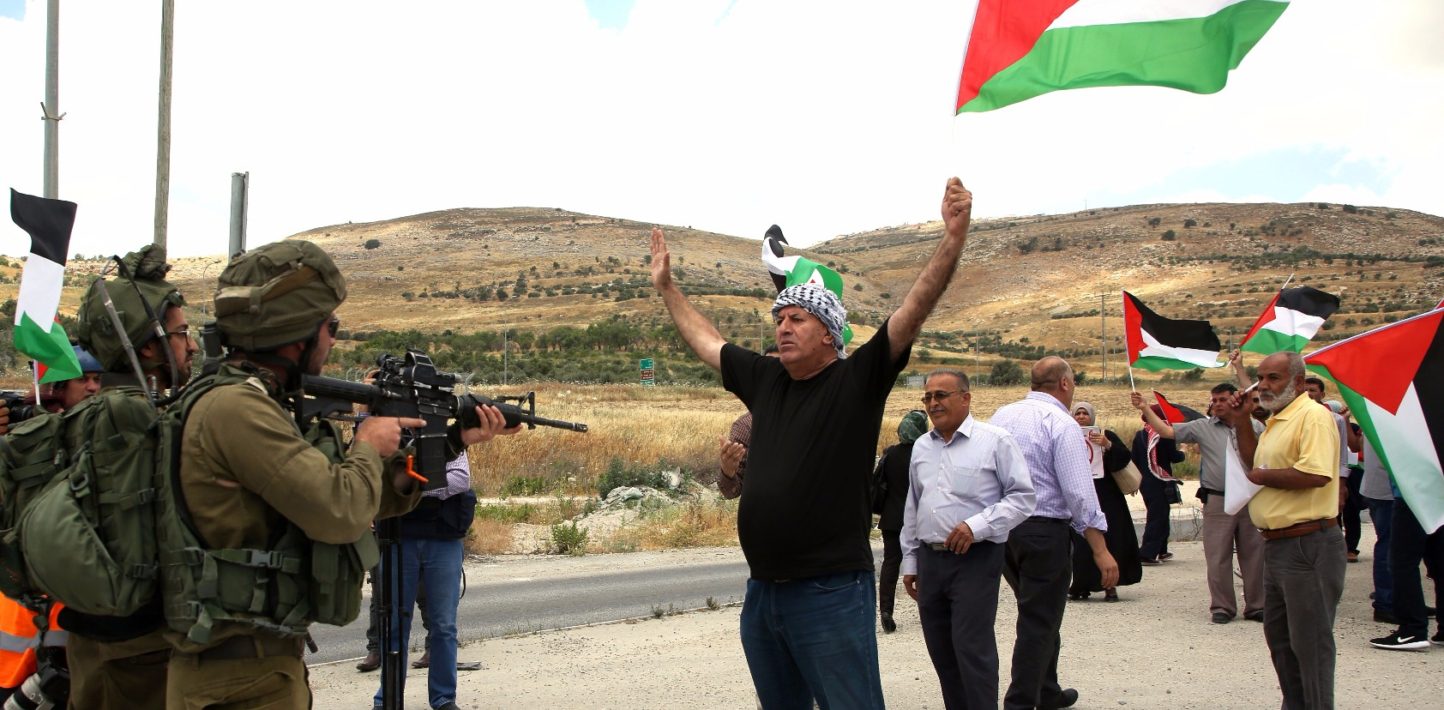Did you know that Israel has been banning Palestinians from organizing any protests for 50 years? This is what daily life under Israeli occupation is for Palestinians.
27 August marks 50 years since Israel issued Military Order 101, a law that punishes Palestinians for peaceful political expression. Anyone breaching the order faces imprisonment for up to 10 years and/or a hefty fine. 50 years on, Military Order 101, which is almost as old as Israel’s occupation of Palestinian territory, continues to apply to Palestinians in the West Bank, and may be enforced at any time.
Here are four facts that bring home the true impact of this draconian law on the daily lives of Palestinians.
1- Unless an Israeli military commander provides authorization in advance, Palestinians in the West Bank are banned from attending and organizing a procession, assembly or vigil of 10 or more people for a political purpose, or where a speech is being made on a political subject, or for a matter that may be construed as political, or even to discuss such a subject.
Since 1967, Israel’s authorities have arrested and detained hundreds of thousands of Palestinians, including women and children, under military orders. Many were detained under Military Order 101 solely for attending peaceful protests that were deemed to be political.
Farid al-Atrash and Issa Amro are two Palestinian human rights defenders currently on trial in an Israeli military court. They face a series of charges, one of which is “participation in a march without a permit,” which is not an internationally recognized criminal offence. They were marching peacefully on 26 February 2016 to protest Israel’s settlements (the Israeli colonies unlawfully established in the OPT) and discriminatory restrictions on movement imposed in the old city of Hebron.
The right to freedom of peaceful assembly, along with the rights to freedom of expression and association, are enshrined in human rights treaties to which Israel is a party, including the International Covenant on Civil and Political Rights.
2- The display of flags or emblems, and the publication of any document or image with politically significant content, without a permit from an Israeli military commander is banned.
Over the last 50 years, Palestinians have been arrested and detained for displaying a poster in a room, if it was deemed political, and for raising the Palestinian flag. Such acts continue to be criminalized despite the fact that in 1993 Palestinians signed a peace accord with Israel that was meant to recognize their political rights. Since then, Palestine has achieved non-member observer status at the United Nations (UN), and more than 135 UN member states recognize Palestine as a state. And yet, raising the Palestinian flag in the West Bank or displaying the ‘wrong’ poster in a room is still a criminal act under Israeli military orders, unless an Israeli army commander authorizes it.
One of the charges against Issa Amro in his ongoing military trial relates to him attending a protest “without a permit” while wearing a T-shirt with “I have a dream” written on it, and waving the Palestinian flag. Such actions were interpreted as political and therefore criminal.
3- Verbal or other expressions of support or sympathy for the activities and aims of any organization deemed illegal under military orders is prohibited. This includes many Palestinian political parties and student unions.
Supporting a political party or a student or trade union that Israel deems to be a “hostile organization”, by waving a flag, signing a hymn or chanting a slogan in a public place, can get you arrested under Military Order 101.
In some cases, arrest and detention are accompanied by torture and other ill-treatment. Palestinians from all walks of life, including journalists, students, teachers, farmers, politicians and drivers, have been affected by this order.
4- Anyone breaching Military Order 101 faces imprisonment for up to 10 years and/or a hefty fine.
Former prisoner of conscience Bassem Tamimi was sentenced to four months in jail and fined 5,000 Israeli shekels (about US$1,280 at the time) on 6 November 2012 for his involvement in peaceful demonstrations against Israeli settlements. As part of a plea bargain, the military judge also imposed a three-month suspended sentence that was to remain active for three years. Bassem Tamimi said he felt compelled to make a plea bargain because he was breaching Military Order 101.
Virtually all cases of Palestinians brought before Israeli military courts end in convictions. Most convictions are the result of plea bargains. This is because Palestinian defendants know the entire system is so unfair that if they go on trial, they will be convicted and given a longer sentence.
TAKE ACTION: Call on Israel to rescind Military Order 101 NOW!
If you want to see what 50 years of Israel’s occupation has meant for Palestinians, click here.


